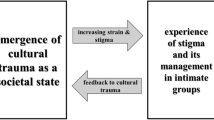Abstract
With the Chinese Dream as a new, signature ideology of the CCP comes the important and challenging task of understanding its concept. This article examines the concept and context of the Chinese Dream, especially its core concept of national rejuvenation. It focuses on tracing the background of the concept and analyzes the context of this new narrative from three closely connected aspects: historical perspectives, domestic legitimacy, and the comprehension of the concept in an international context.
Similar content being viewed by others
References
“Xi Pledges ‘Great renewal of Chinese nation,’” Xinhua, 2012 http://news.xinhuanet.com/english/china/2012-11/29/c_132008231.htm.
General secretary Xi Jinping’s fifteen speeches systematically elaborate the Chinese dream [习近平总书记15篇讲话系统阐述“中国梦”], People’s Daily, 2013 http://theory.people.com.cn/n/2013/0619/c40531-21891787.html.
Liu Qibao, “Some points of understanding concerning the theoretical structure of socialism with Chinese characteristics” [关于中国特色社会主义理论体系的几点认识], People’s Daily, 2013 http://opinion.people.com.cn/n/2013/0708/c1003-22109528.html.
“Xi Pledges ‘Great renewal of Chinese nation,’” Xinhua, 2012 http://news.xinhuanet.com/english/china/2012-11/29/c_132008231.htm.
“Xi Pledges ‘Great renewal of Chinese nation,’” Xinhua, 2012 http://news.xinhuanet.com/english/china/2012-11/29/c_132008231.htm.
Wang, Zheng. 2012. Never forget national humiliation: Historical memory in Chinese politics and foreign relations. New York: Columbia University Press.
Callahan, W.A. 2004. National insecurities: Humiliation, salvation, and Chinese nationalism. Alternatives 29: 206.
Gries, P.H. 2004. China’s new nationalism: Pride, politics, and diplomacy. Berkeley: University of California Press.
Billy O. Wireman. “The people’s republic of China turns 50,” Vital Speeches of the Day, July 15, 2000.
Schell, Orville, Delury John. 2013. A rising china needs a new national story. Wall Street Journal http://online.wsj.com/article/SB10001424127887324425204578599633633456090.html.
Galtung, Johan. 2001. The Construction of National Identities for Cosmic Drama: Chosenness-Myths-Trauma (CMT) Syndromes and Cultural Pathologies. In Handcuffed to history, ed. P. Udayakumar. Westpoint: Praeger.
Volkan, V.D. 1997. Bloodlines: From ethnic pride to ethnic terrorism, vol. 48. New York: Farrar, Straus & Giroux.
Vamik D. Volkan, Bloodlines: From Ethnic Pride to Ethnic Terrorism (New York: Farrar, Straus & Giroux, 1997), 81. Vamik D. Volkan, “Large Group Identity and Chosen Trauma,” Psychoanalysis Downunder 6 (2005): 6.
Vamik D. Volkan, Bloodlines: From Ethnic Pride to Ethnic Terrorism (New York: Farrar, Straus & Giroux, 1997), 81.
Ibid, 48.
Zheng Wang, “Not Rising, But Rejuvenating: The ‘Chinese Dream,’” The Diplomat, February 5, 2013 http://thediplomat.com/2013/02/05/chinese-dream-draft/.
Johan Galtung, Globe Projections of Deep-Rooted U.S. Pathologies, Occasional Paper no. II (Fairfax, VA: Institute for Conflict Analysis and Reolution, 1996): 9–10.
Vamik D. Volkan, “Large Group Identity and Chosen Trauma,” Psychoanalysis Downunder 6 (2005).
Kellas, J.G. 1998. The politics of nationalism and ethnicity, 196. New York: Macmillan.
Max Weber, Essays in Sociology, H.H. Gerth and C. Wright Mills eds. (New York: Oxford University Press, 1946).
X.L. Ding, The Decline of Communism in China: Legitimacy Crisis, 1977–1989 (Cambridge: Cambridge University Press, 1995), 164.
Chen, Jie. 1995. The Impact of Reform on the Party and Ideology in China. Journal of Contemporary China 9: 22–34.
Renwick, Neil, and Qing Cao. 1999. Chinese Political Discourse Towards the 21st Century: Victimhood, Identity and Political Power. East Asia: An International Quarterly 17(4): 111–143.
Jiang Zemin, “Speech at the 6th Plenary Session of the 14th CCP National Congress,” Beijing, October 10, 1996
Jiang Zemin, “Report at the 16th CCP National Congress,” Beijing, November 14, 2002
Hu Jintao, “Report at the 17th CCP National Congress,” Beijing, October 24, 2007
Maria Bondes and Sandra Heep, “Conceptualizing the Relationship between Persuasion in Legitimacy: Official Framing in the Case of the Chinese Communist Party,” Journal of Chinese Political Science 18 (4), 317–334.
Rozman, Gilbert. 2012. Invocations of Chinese traditions in international relations. Journal of Chinese Political Science 17(2): 111–124.
“Full Text of Constitution of the Communist Party of China,” Xinhua, October 25, 2007 http://news.xinhuanet.com/english/2007-10/25/content_6944738.htm.
“Xi Pledges ‘Great Renewal of Chinese Nation,’” Xinhua, November 29, 2012 http://news.xinhuanet.com/english/china/2012-11/29/c_132008231_2.htm.
Hu Jintao, “Report at the 17th CCP National Congress,” Beijing, October 24, 2007
Jiang Zemin, “Speech at the Meeting Celebrating the 80th Anniversary of the Founding of the Communist Party of China” People’s Daily, July 1, 1991
“President Vows to Bring Benefits to People in Realizing ‘Chinese Dream,” Xinhua, March 17, 2013 http://news.xinhuanet.com/english/china/2013-03/17/c_132240052.htm.
Alastair Iain Johnston, “Is China a Status Quo Power?,” International Security Vol. 27, No. 4 (Spring 2003): 5–56.
“Xi Pledges ‘Great Renewal of Chinese Nation,’” Xinhua, November 29, 2012 http://news.xinhuanet.com/english/china/2012-11/29/c_132008231_2.htm.
Author information
Authors and Affiliations
Corresponding author
Rights and permissions
About this article
Cite this article
Wang, Z. The Chinese Dream: Concept and Context. J OF CHIN POLIT SCI 19, 1–13 (2014). https://doi.org/10.1007/s11366-013-9272-0
Published:
Issue Date:
DOI: https://doi.org/10.1007/s11366-013-9272-0




